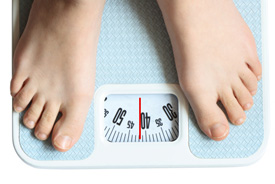The older most of us get, the thicker we get.
 We could have used the “F” word, but who wants to be told they’re getting fat?
We could have used the “F” word, but who wants to be told they’re getting fat?
The old assertion is that this is just par for the course with getter older. Our metabolisms are slowing down, our hormones are changing, it gets progressively easier to gain weight and harder to lose it.
Is this really true?
Your metabolism does slow down as you get older. This starts at about age 30 and it’s not quite as substantial a change as you may be inclined to think. In fact, in a recent Ottawa Citizen article talking about exercise and weight management, Ottawa’s own weight management authority, Dr. Yoni Freedhoff, said “eat the same from 30 to 60 and you may well be 30 pounds heavier.”
Thirty pounds is a lot, but averaged over a 30-year period, that only works out to a pound of weight gain a year that Dr. Freedhoff would attribute to metabolic changes. Now, some other factors can accelerate this, such as the hormonal changes that women experience with the onset of menopause. But, by and large, the “slowing metabolism” argument alone can’t account for the more rapid or substantial weight gain that many people experience as they pass 40.
What does? The simple fact that you are slowing down faster than your metabolism.
It happens to the best of us. We’re busy with work, the kids, and family engagements. It’s hard to schedule regular exercise and too easy to slump on the couch and order unhealthy takeout at the end of a long day.
On the other hand, the fact that it’s you, not your metabolism, means that you can take action.
Fighting your own habits is easier than going to war with a biological clock.
The question is how
We’ve written many times on the Hazeldean Family Chiropractic blog about eating better, about the need to adopt new habits that become the basis of a new lifestyle that’s second nature. Because fad diets and starvation methods that leave you with cravings work against you in the long run.
We won’t revisit all that here, and invite you to go back and read one of our past posts on the subject.
The other half of this equation is exercise. Exercise of course, burns calories. A specific kind of exercise, weight training, also protects you from another consequence of aging which we wrote about recently – sarcopenia, the natural loss of muscle mass.
But for pure calorie burn, nothing beats intense exercise that gets you sweating and panting. At least, that’s been the conventional wisdom.
Benefits of HIITing the gym overated?
Many studies have touted the benefits of high-intensity interval training – HIIT. These are workouts of little as 15 or 20 minutes in length that provide the same metabolic benefits of less-intense workouts that are twice as long. This time efficiency is a big selling point.
But HIIT demands that you work your buttocks off, at a pulse-pounding 80 to 90 per cent of your maximum heart rate. That’s a lot for many people to bear, especially if they are not exercise fanatics to begin with.
A recent study followed 104 new HIIT exercisers for 12 months and found that only 24 were still working out two or more times a week at the end of that period. 60 per cent had abandoned HIIT altogether.
Maybe HIIT would work for you, maybe it wouldn’t. What’s important is that you find something that does and stick with it.
You may find this encouraging.
That Citizen article we quoted up top looked at yet another study, from the National Cancer Institute in Bethesda, Md., which tracked nearly 5,000 Americans over 40 for six years. It concluded that the benefits of moderate to vigorous exercise to reduce your odds of dying young accumulate regardless of the type or duration of activity being performed.
Just be active
The study results suggest that intense exercise like HIIT offered no more benefit than less intense forms of exercise (beyond just taking less time). Nor does it much matter if that exercise is accumulated through 45-minute workouts or a string of five and ten-minute bouts. The most important thing is to just move for at least 150 minutes a week in total.
It seems we can always dig up a study that makes one assertion or another. The important takeaway from all this is to find what works for you. If HIIT is your thing, that’s great. If long walks work, that’s good, too. If you love pumping iron till you burn, go for it. Even better, change it up and do a variety of things.
The key thing to remember is that your choices and your behaviours, more than any one factor beyond your control, will dictate how healthy and fit you are as you age.
